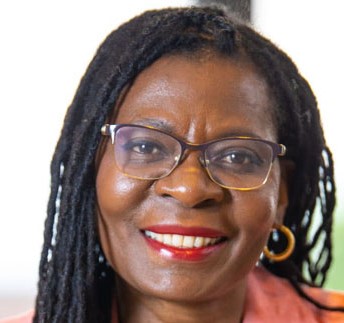September 30, 2021

By Alyson Renaldo
Guest Contributor
When Memorial University-tenured professor of social work (and friend), Dr. Delores Mullings, phoned to tell me that she had accepted the inaugural post of Vice Provost of Equity, Diversity and Inclusion, on August 27, we exchanged excitement and a few high-pitched vocalisations of glee — not usually found in conversations about work.
The joyous responses were expected, but Delores’ ensuing statement was not: “[When I found out] I thanked everyone [during] my gratitude practise. There on my knees, the Sam Cooke song, A Change is Gonna Come, began playing…I burst into tears.”
Dr. Delores Mullings “is no stranger to surmounting challenges or scrutiny”. Photo contributed.
Tears? I thought, and wondered if the salty discharge, she was describing, was a result of an aggressive yawn. You see, Delores Mullings has been working in the trenches of social work her entire career; seeing up close, what many can barely handle from a distance, yet speaks to all of that with poise and detached passion.
What, in an administrative job offer, could cause such an emotive outburst? I wondered and had to probe deeper.
“I’ve been preparing for this [new] role all of my professional life,” she explains, “but I didn’t know it. Everything I’ve been doing in social work: work with sex workers, racialised persons, LGBTQ2+, mature citizen advocacy has been because of my commitment to social justice.”
“Initially,” she elaborates, of the new post, “I hesitated to apply for the position, because I knew that accepting would place me under intense scrutiny; working across all disciplines, and with all players [at the university]. It would be a challenge.”
Challenge? It’s debatable whether Delores has ever used that word in reference to her own life, though she has cause. Detached passion underpins her recollections of undergraduate education, as a single mother, in her late thirties. Finding financing for the three degrees herself, while working and maintaining a home for her children. She is no stranger to surmounting challenges or scrutiny.
I’m still perplexed, but I shelve the question, for the moment.
“It became important for me to move from field work to academia, to challenge the Eurocentric monopoly on teaching and learning and to help revolutionise Memorial University –from an equity lens perspective.
I want to create a space, where anyone who wants to contribute, can. The complexity of Canadian society means that everyone must be accounted for, or we cannot have our best. I’m invested in securing Canada’s best,” she clarifies.
According to Universities Canada, Memorial’s new hire places the institution on the right side of a 2017 mandate, by the organisation’s members, to attract and retain “students, faculty, staff and leaders, from all backgrounds, and commit to being active champions of equity, diversity and inclusion on our campuses, in our communities and across the country”.
And a Black woman, born in Jamaica and immigrating to Ontario as a teen, feels that Newfoundland and Labrador are prime spaces to further this important work?
“Memorial University is uniquely placed to be the university for the province, the nation and the world. Locally to globally, it will meet that objective firstly, by catering to all of Newfoundland and Labrador, including all those who have long histories in the province and those who are newer.”
There’s a clarity of purpose as she discusses her new role and continued purpose.
We continue; and why Newfoundland?
“I came for the work and stayed to contribute to the expansion and progression of the region,” she explains.
What don’t people know about Newfoundlanders? “[that] everywhere I travel I meet someone from the province. They travel a lot.”
Given Dr. Mullings professional past, this job should be an easy fit, correct? “Actually, I know this job will be one of the most difficult jobs I’ve ever done. It’s about organisational transformation of the culture at Memorial, so that when people come, they want to stay, because they see themselves reflected in the research and the work.”
“Further,” she continues, “having our management fully represent our students is paramount in preparing students to be 21st century citizens, the next generation of dynamic leaders.”
The author, left, in deep thought, during a conversation with her friend, Dr. Delores Mullings. Photo contributed.
My ‘shelf’ breaks. I must know, given the clarity of purpose, what is it about the news of this posting that made her so emotional upon hearing it? Delores has aided in realising Sam Cooke’s ‘prediction’ before.
“That song speaks to the post-George Floyd public execution. Memorial University can model for the world how our society can respond to human rights violations, anti-Black racism, racism, homophobia and (dis)abilities at the intersection. I’m excited about that. I know this work is difficult, but I also know how systemic racism works. There are plenty of brilliant Black PhD’s who are not afforded the opportunity I now have.”
She pauses, a pregnant pause: “I must contribute, until space is made for them to contribute…which…now that I think about, is the deeper reason that tears overtook me in that moment…because I stand in continual solidarity with them and their struggle to do good work.”
Being overcome was not only about Delores’ personal professional journey, but about her professional community solidarity: the social work. Memorial University may have chosen well in this instance.
Source: Pride Magazine
